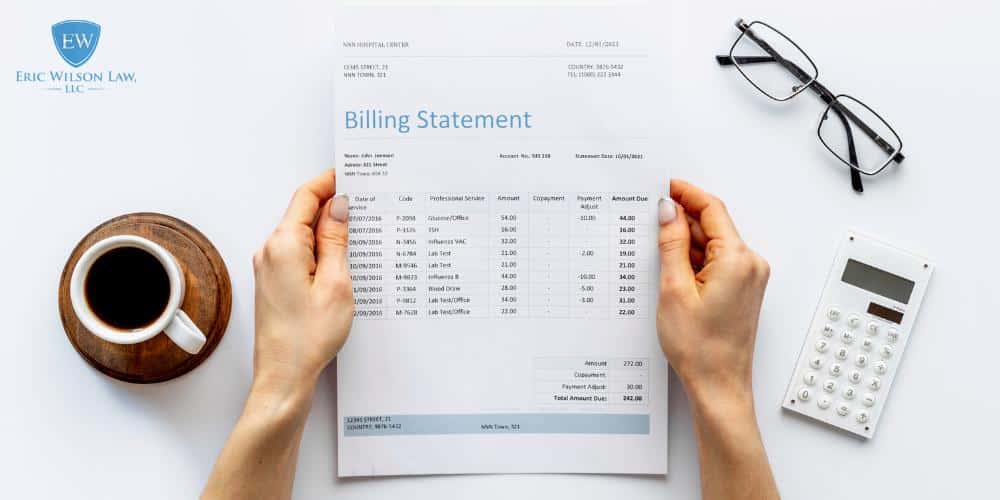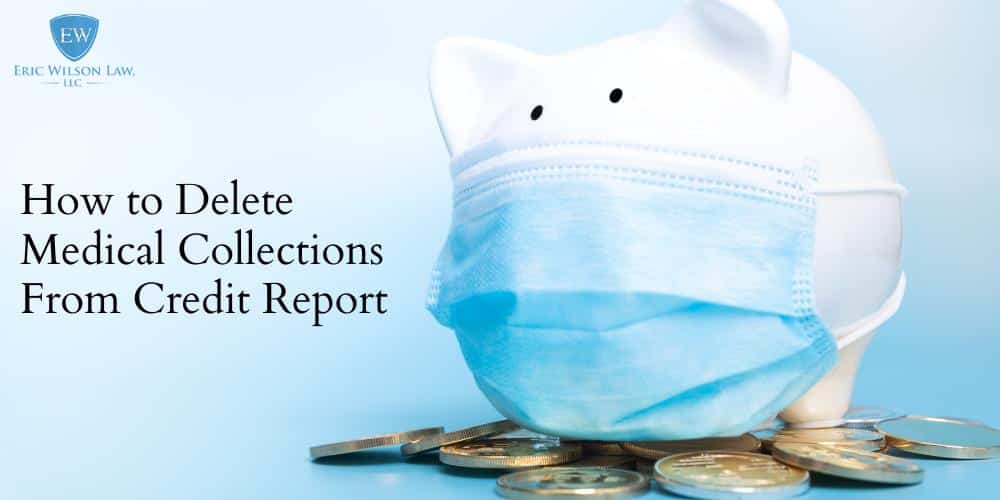Did you know: 58% of bills sent to collection agencies are medical bills according to the Consumer Finance Protection Bureau. As you may be well aware, both paid and unpaid medical bills affect credit scores greatly. These debts can leave negative marks on your credit history for up to seven years and therefore make it difficult to obtain loans, get certain types of credit cards, get the type of housing you want, and so much more. This may lead you to frantically Google something like: “How to Delete Medical Collections From Credit Report.” Unfortunately, you cannot remove unpaid medical bills in collections unless there is some kind of obvious error. But there is good news: President Biden recently made changes regarding how medical bills affect your credit. We explain all this and more below.
If you are drowning in medical debt, credit card debt, or any other type of debt, the legal team at Eric Wilson Law wants to help you. Call 205-349-1280 to schedule a free consultation today.
What are Medical Collections?
Medical debt collections happen when unpaid medical debt gets sent to a debt collection agency. Unpaid debts generally don’t get sent to a collections agency until the payments are between 120 and 180 days late. Debt collectors will then begin to contact you on a regular basis so that you will pay the debt at the collection agency.
How Medical Collections Can Affect Your Credit
Any type of debt that is sent to collections can negatively impact your credit. Your credit report basically tells lenders how financially responsible you are, and if one or more “negative marks” show up on your credit (such as unpaid debt in collections), your credit score can suffer greatly. Not only that, but one or more collections accounts on a credit report can prevent people from obtaining loans and certain types of credit cards too.

Can You Remove Medical Collections From Your Credit Report?
If a healthcare provider turns an unpaid medical bill over to a collections account, you cannot remove it unless there is an obvious error. For example, maybe your medical bills wrongfully ended up in a collection account. You could definitely get errors like this removed.
It’s important to note that any type of debt in collections will appear on your credit report for up to seven years, whether you have paid off the collection account or not. The good news is that paid collection accounts look much better to future lenders than an unpaid collection account. Still, it’s crucial to prevent medical bills (or any other type of debt) from going into collections for the sake of your credit score.
New Changes Regarding Medical Debt and Credit
There is good news for all those who are frantically Googling: “How to Delete Medical Collections From Credit Report” after seeing that scary negative mark on their credit report. President Biden recently made some changes regarding medical debt and credit so that Americans won’t have to struggle so hard to maintain good credit scores and obtain loans.
As of July 1, 2022, the three major credit bureaus (Experian, Equifax, and TransUnion) must remove paid medical collections debt from credit reports. So if medical providers send medical bills to collections, and people (or insurance companies) pay off those collections accounts, the negative mark will no longer appear on credit reports.
Listed below are other recent changes regarding medical collection debt and credit reports:
- Credit bureaus must wait at least 1 year (instead of the previous time frame of 6 months) to include unpaid medical debt on a credit report.
- Starting January 2023, medical collection debt that is worth less than $500 will not appear on credit reports.
These changes give Americans more financial freedom to obtain loans, credit cards, affordable housing, and so much more.
Medical Debt Collections and Health Insurance
When a health insurance company pays medical bills that are in collections, credit bureaus must remove it from credit reports.
How to Dispute Medical Collections
If your paid medical collection debt is still appearing on your credit report despite these new regulations passed by President Biden, you can definitely dispute it. Additionally, you have grounds to dispute any other errors on your credit report. According to the Fair Credit Reporting Act, credit reporting agencies are legally required to report the most accurate information on all consumer credit reports.
Here is a short and simple guide to disputing errors on credit reports:
- Gather Evidence: You cannot just tell credit agencies that there is an error without any proof. Be sure to ask your medical provider for documentation about the paid medical debt. If you paid off your debt instead of an insurance company, make sure to prove it through old credit card statements or canceled checks.
- File a Dispute through the credit bureau that is reporting the error about your medical bills. You can file a dispute with Equifax here, with Experian here, or with TransUnion here. While you’re waiting for the paid medical debt to be removed, be sure to check your credit score by requesting a free credit report from your bureau.
- Keep Communicating With the Credit Bureau: You have rights under the Fair Credit Reporting Act. Keep communicating with your credit bureau on a regular basis until the error is corrected.
- Call Eric Wilson: If your paid medical bills are still negatively impacting your credit despite your attempts to dispute errors, you have grounds to contact an attorney at Eric Wilson Law. He can make sure that your legal rights are protected.
Most of the time, credit bureaus will investigate and resolve errors on credit reports within 30 days. Occasionally, credit bureaus will take up to 45 days to investigate and resolve errors. Still, they are required to resolve disputes as quickly as possible.
How to Prevent Medical Bills From Affecting Your Credit
Although medical bills now have less of an impact on credit scores (especially depending on the scoring model), they can still wreak havoc. As with most things: prevention is key. Here are the best ways to prevent medical bills from affecting your credit:
- Ask your insurance company about which medical bills they will cover and which ones they won’t. That way, you can figure out your own personal payment plan.
- If your medical bills are sky-high and unmanageable, negotiate with your medical provider. They may be able to offer you a payment plan or a lower bill.
- Make sure to pay a little bit every single month. This can help prevent unpaid medical debt going into collections.
- Ask Eric Wilson for financial help. He can help you determine the best way to get not only your medical debt under control, but your other debts too.

Call a Tuscaloosa Bankruptcy Lawyer at Eric Wilson Law Today
If your credit history and credit score is suffering due to unpaid medical bills, it’s okay to reach out for financial help. Managing finances is a huge, confusing stressor for everyone in this economy, especially if you have just suffered a major medical crisis. The legal team at Eric Wilson law can help you achieve debt relief through bankruptcy and other methods.
Additionally, if credit bureaus are violating your legal rights or debt collectors are harassing you, you may have grounds to take legal action. Call Eric Wilson Law at 205-349-1280 to schedule a free consultation today.


